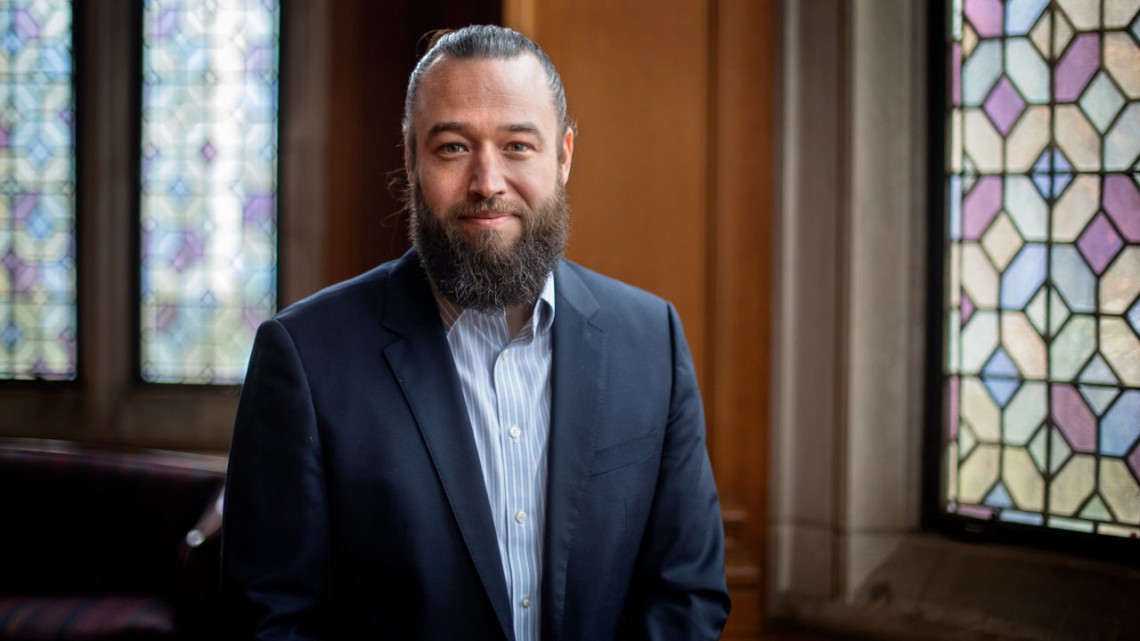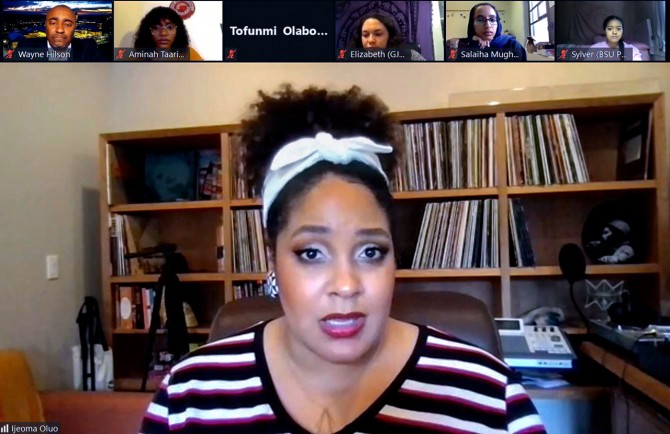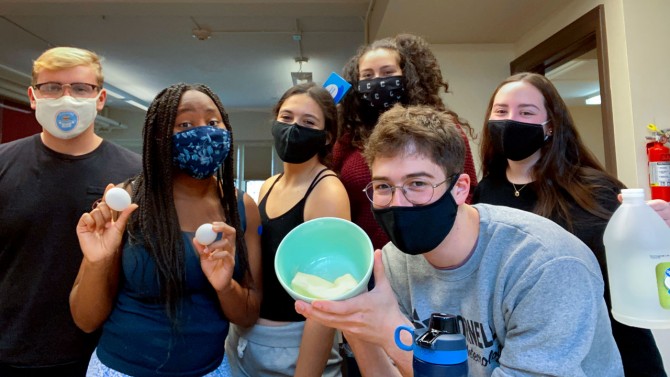
Oliver Goodrich, associate dean for spirituality and meaning-making, says he and his associates in Cornell United Religious Work have worked hard to support students through the pandemic.
Spirituality on campus: all about finding meaning
By Tom Fleischman
When “meaning-making” became part of Oliver Goodrich’s professional title in February 2020, even his good friends weren’t quite sure of its meaning, or what to make of it.
Goodrich began his new job – as Cornell’s associate dean for spirituality and meaning-making, in the Division of Student and Campus Life – just as a mysterious virus was beginning to spread across the globe.
“Like so many of us, I struggled to make sense of what was happening,” he says during a recent podcast on spirituality. “I reached out to friends near and far to connect and process and grieve. And oftentimes, my friends would tease me a little bit – ‘Hey, how’s it going with that new job? You making lots of meaning?’”
Goodrich – along with two dozen chaplains and the many students associated with the Office of Spirituality and Meaning-Making (OSMM), which includes the cooperative interfaith Cornell United Religious Work (CURW) – are helping people make their own meaning, by helping them discover purpose during a most difficult time.
“The reason we talk about religion and spirituality is, all of us are wired to make meaning of the events that we experience,” says Goodrich, who came to Cornell from Loyola University of Chicago, where he served for seven years as faith formation campus minister.
“The developmental psychologist William Perry says, ‘Organisms organize, and the human organism organizes meaning,’” Goodrich says. “As humans, we try to organize meaning and to make sense of the world around us.”
Like nearly every other aspect of life at Cornell, OSMM had to adjust to the pandemic, and with a brand-new leader at the helm. Goodrich had just begun to settle into his Anabel Taylor Hall office, when he was forced to move off campus. The more than 100 affiliates who support the 24 chaplaincies who make up CURW moved most of their programs online, including live streams of religious services and chaplain-hosted social gatherings that went virtual.
“I think that OSMM has done a fantastic job of supporting and listening to Cornell students during the pandemic,” says Danny Alvarado-Gómez ’22, a communications major who’s also a digital communication and social media strategies assistant in OSMM, managing the office’s Twitter and Instagram accounts.
“Oliver is always very attentive to students’ concerns, current events and ways we can do better,” Alvarado-Gómez says. “ He’s always listening to potential sources of stress or sadness students may have, whether on the national or campus level.”
Rabbi Ari Weiss, executive director of Cornell Hillel and one of CURW’s affiliated chaplains, called Goodrich a “force for good” since his arrival.
“It’s definitely been tough that he’s been here in this moment of transition,” Weiss said. “But I think the students are lucky to have him. In a sense, it’s very fortunate that he arrived at this moment, so that he could be there for students.”
Marla Love, the Robert W. and Elizabeth C. Staley Interim Dean of Students, agrees.
“Oliver has encouraged engagement in reflective practices, and is holding space for students who are experiencing pain, loss and uncertainty,” Love says. “I am grateful for Oliver’s adaptability, and the intention and compassion he infuses into his support of students. He is helping us all ask hard questions about life and ourselves to better understand our purpose.”
Going virtual
One of the programs Goodrich has instituted for students is CURW Care Groups – chaplain-facilitated community groups that help participants give and receive spiritual support and care. The weekly Zoom meetings, which have concluded for this semester but are expected to resume in the fall, offer a safe space for students to speak from their own particular experiences.
“We’re really trying to create these spaces where students can connect in interfaith spaces, beyond their own particular religious tradition,” says Goodrich, who received his bachelor’s degree in voice performance from Gordon College in 2003, and a master of education in religious education from Boston College in 2013. “These Care Groups are about creating places of belonging in a virtual world where we know students are feeling increased amounts of loneliness and social isolation.”
The OSMM also shifted existing programs online, including the popular Soup & Hope, which concluded its six-speaker 2021 series on April 8. This year’s Martin Luther King Jr. Commemoration Event on March 1 – featuring author and activist Ijeoma Oluo in conversation with Cornell history professor Ed Baptist – was held virtually and drew an audience of approximately 400.
And the Jan. 6 siege of the U.S. Capitol was the impetus for a new speaker series, Into and Out Of the Echo Chambers. Author and filmmaker Valarie Kaur gave the series’ inaugural talk on March 22, titled “See No Stranger.”
“If we couldn’t predict a pandemic, we certainly couldn’t have predicted the insurrection,” Goodrich says. “That was also part of trying to be a more responsive religious and spiritual life organization.”
At Cornell and across the country, organized religion has seen a marked drop in memberships across denominations; a recent Gallup poll revealed that church membership among U.S. adults dipped below 50% for the first time since the organization began tracking it eight decades ago.
And the 2019 Cornell Undergraduate Experience Survey revealed that the largest single group of students by religious affiliation were “nones” – those who claim no formal affiliation (45%).
“It used to be that religion was a pretty big category that a lot of people connected with, but that’s become less so,” Goodrich says. He believes that the decline in religious affiliation can be attributed at least partially to the perception that some religious organizations are more interested in serving their own self-interests rather than the people they serve.
In response to the larger cultural shifts, Goodrich has taken steps to ensure that the chaplains affiliated with CURW are seen as the trustworthy and responsible professionals that they are. He recently introduced a new process by which chaplains can affiliate with CURW.
“We have a talented team of affiliated chaplains, many of whom have served Cornell students for years and who care deeply about our community,” Goodrich says. “I want our community to know that our campus ministry team has been thoroughly vetted and are outstanding religious leaders.”
Religion vs. spirituality
While related, religion and spirituality are not the same thing, Goodrich says.
“Religion traditionally refers to institutionalized spaces. Spirituality as a category partially overlaps with religion, but also exists beyond religion and is inviting to people who don’t identify with a particular tradition,” he says. “The category of meaning-making is even more broad and inclusive, open to everyone regardless of worldview or spiritual identity.”
“For me, spirituality means connecting with yourself and to something greater than yourself,” Alvarado-Gómez says. “This could mean God, the universe, energy, morality, or something or someone else. Spirituality does not necessitate religion, but when together, they go hand-in-hand.”
“Spirituality, for me, is an ingredient of religion,” Weiss says. “Religion is, in a sense, all-encompassing and connects to serve practices and beliefs. And for me, maybe spirituality is the engine of religion, it’s the thing that animates religion.”
Both concepts contribute to CURW’s foundational commitment to diversity and inclusion on campus. The organization hosted Martin Luther King Jr. twice in the early 1960s, and the late civil rights leader’s father in 1979, and in between helped calm the campus during the upheaval of the late ’60s.
The pandemic – combined with the racial tensions that have heightened in the wake of numerous police-involved killings of Black people – have laid bare some grave inequities in our society, Goodrich says.
“I use this analogy: While everybody’s putting on masks, social inequity has been unmasked – the inequities in health care access and vaccine distribution and police brutality,” he says. “Time and time again, we see these issues. And so I think there’s a real opportunity for religious life and spiritual life to be part of a broader conversation around the question, what is the world that we want to imagine together, and what role do our students want to play in building that world?”
In other words, what meaning can students make in their lives in 2021?
“In addition to trying to figure out their place in this world and the work that they’re going to do, there’s a sense of urgency,” he says. “The systems that brought us to this moment weren’t working super well. Over the last year, we’ve had a break from ‘business as usual.’ Our students are challenging us all to reconsider the inadequacies of our old systems and to imagine new, more just and equitable ways of operating.”
With lots of time away from some of their normal activities, students have had a little bit more time to reflect on some of these questions.
“Not all of these big question have been answered, nor are all students drawn to explore these questions in religious spaces,” he says. “But the CURW chaplains and I have been broadly trying to lift up the kinds of questions and spaces that support them in their search to make meaning.”
Media Contact
Get Cornell news delivered right to your inbox.
Subscribe


